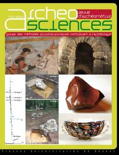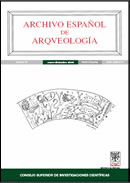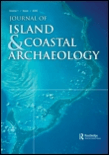
Baltica
Scope & Guideline
Illuminating the Path of Geological Discovery.
Introduction
Aims and Scopes
- Archaeological Research:
The journal emphasizes archaeological discoveries and methodologies, showcasing studies that analyze artifacts, settlement patterns, and burial practices across different historical epochs. - Cultural Heritage Studies:
A core area of focus is the exploration of cultural heritage, including the impacts of socio-cultural changes on communities, as well as the preservation and interpretation of archaeological sites. - Environmental and Subsistence Studies:
Research on ancient diets, subsistence strategies, and interactions with the environment, particularly through isotopic analysis and material studies, is a significant aspect of the journal's contributions. - Material Culture Analysis:
The journal includes detailed examinations of material culture, such as pottery, metalwork, and other artifacts, assessing their typology, chronology, and socio-cultural implications. - Interdisciplinary Approaches:
'Baltica' encourages interdisciplinary methodologies, integrating archaeology with other fields such as history, anthropology, and environmental science to provide a holistic understanding of the Baltic region's past.
Trending and Emerging
- Isotopic Analysis and Diet Reconstruction:
Recent publications have increasingly employed stable isotope analysis to reconstruct ancient diets, indicating a growing interest in understanding subsistence strategies and environmental adaptations in historical populations. - Interdisciplinary and Technological Approaches:
The incorporation of advanced technologies, such as portable X-ray fluorescence for material analysis, demonstrates a trend towards interdisciplinary methodologies that enhance the reliability and depth of archaeological research. - Focus on Prehistoric and Early Historical Periods:
There is a notable trend towards exploring prehistoric and early historical periods, particularly the Late Bronze Age and Iron Age, reflecting a desire to understand foundational cultural developments in the Baltic region. - Cultural Heritage and Community Engagement:
Emerging themes also include a focus on cultural heritage and its significance to contemporary communities, emphasizing the relevance of archaeological findings in modern societal contexts.
Declining or Waning
- Classical Antiquity Studies:
Research focusing on classical antiquity, particularly the Roman period, has seen a decrease, indicating a potential shift towards earlier and more localized archaeological contexts. - Urban Archaeology of Early Modern Periods:
The exploration of urban development and archaeological findings from early modern periods, while still present, appears less frequent compared to the increasing focus on prehistoric and early historical contexts. - Traditional Artifact Typologies:
There seems to be a waning interest in traditional typological studies of artifacts, as the journal shifts towards more innovative analytical methodologies and interdisciplinary approaches.
Similar Journals

Kratkie Soobshcheniya Instituta Arkheologii
Exploring the Depths of History and ArchaeologyKratkie Soobshcheniya Instituta Arkheologii is a prestigious academic journal published by IZDATELSTVO NAUKA, specializing in the fields of archaeology and history. With an ISSN of 0130-2620, this journal has established itself as a vital resource for scholars, researchers, and students engaged in the humanities, particularly within the Russian Federation. Recognized for its high-quality contributions, it has achieved a remarkable Q1 ranking in both Archaeology and History for the year 2023, demonstrating its significant impact and relevance in these disciplines. Although it does not provide open access, the journal's robust positioning in Scopus — ranking #634 in History and #208 in Archaeology — further attests to its scholarly authority and the insightful research it disseminates. The journal covers a comprehensive range of topics, facilitating a deeper understanding of archaeological practices and historical methodologies, thereby fostering academic dialogue and knowledge advancement from 2018 through 2024. Addressing an international audience of professionals and students alike, Kratkie Soobshcheniya stands as a cornerstone for innovative research in archaeology and history.

Studijne Zvesti Archeologickeho Ustavu Slovenskej Akademie Vied
Innovating methodologies for a deeper understanding of archaeology.Studijne Zvesti Archeologickeho Ustavu Slovenskej Akademie Vied is a leading journal in the field of archaeology, published by the SLOVENSKA AKAD VIED, ARCHEOLOGICKY USTAV, based in Nitra, Slovakia. This esteemed journal, with the ISSN 0560-2793, has established itself as a vital resource for scholars and researchers, reflecting significant academic contributions in both the arts and humanities as well as social sciences. With a 2023 Scopus ranking placing it in the second quartile (Q2) for archaeology, it showcases rigorous research and innovative methodologies, essential for advancing archaeological studies. While it is not an Open Access journal, it continues to offer valuable insights into archaeological findings, theoretical frameworks, and interdisciplinary approaches. The journal serves as a bridge, connecting local Slovak archaeology with international discourse, making it an indispensable tool for students, professionals, and academics striving for a deeper understanding of the archaeological heritage of Slovakia and beyond.

ArcheoSciences-Revue d Archeometrie
Fostering Interdisciplinary Insights in Archaeological ScienceArcheoSciences-Revue d Archeometrie is a prominent scholarly journal dedicated to the field of archaeology, published by PRESSES UNIV RENNES in France. With an ISSN of 1960-1360 and an E-ISSN of 2104-3728, this journal has gained recognition for its focus on the intersection of science and archaeological research, aiming to foster interdisciplinary dialogue and innovative methodologies within archaeological studies. Although coverage of the journal has been discontinued in Scopus post-2021, it has maintained a respectable standing with a Q3 Quartile ranking in both the Archaeology (Arts and Humanities) and Archaeology categories as of 2023, as well as commendable Scopus rankings in relevant fields. As an accessible platform for researchers, professionals, and students, ArcheoSciences offers valuable insights into applied techniques and findings in archaeological science, making it an essential resource for those involved in the historical and cultural analysis of material relics. Researchers are encouraged to explore this journal to stay informed about frontier research and ongoing discussions in the discipline.

Archivo Espanol de Arqueologia
Advancing archaeological knowledge through open access.Archivo Español de Arqueología is a prestigious journal published by the Consejo Superior de Investigaciones Científicas (CSIC), dedicated to the field of archaeology and the historical sciences. Since its transition to Open Access in 1991, this journal has been a significant resource for scholars and practitioners in Spain and beyond, ensuring the dissemination of high-quality research to a broad audience. With an impressive Scopus ranking that places it within the top 20% of journals in the disciplines of History and Archaeology, Archivo Español de Arqueología plays a crucial role in advancing academic discourse and promoting innovative archaeological methodologies. The journal has maintained rigorous standards, reflected in its placement within the Q2 and Q3 quartiles, enabling it to establish a reputation for excellence and reliability in archaeological scholarship. Researchers, professionals, and students are encouraged to explore the journal's diverse array of articles from its foundation year of 2009 to the present, enriching their understanding of the past through the latest findings and theoretical advancements in archaeology.

ANTIQUITY
Exploring the Depths of Human HistoryANTIQUITY is a prestigious academic journal published by Cambridge University Press that has been at the forefront of archaeological and humanities scholarship since its inception in 1927. With its roots firmly planted in the United Kingdom, the journal has achieved remarkable recognition, maintaining a Q1 ranking in both the fields of Archaeology and Arts and Humanities as of 2023. With an impressive Scopus ranking of #3 out of 173 in General Arts and Humanities and #28 out of 354 in Archaeology, it underscores its significant impact and influence in shaping contemporary discourse in these domains. Although it is not an Open Access journal, ANTIQUITY provides crucial insights into the evolution of human societies through a comprehensive range of archaeological studies, reviews, and theoretical discussions. By facilitating knowledge exchange among researchers, professionals, and students, ANTIQUITY not only enriches academic literature but also fosters a deeper understanding of our past.

Rossiiskaya Arkheologiya
Connecting Researchers to the Foundations of CivilizationRossiiskaya Arkheologiya, published by IZDATELSTVO NAUKA, stands as a leading academic journal in the field of archaeology and history, renowned for its commitment to advancing scholarly discourse and research in these vital humanities disciplines. With an impressive Impact Factor and a distinguished position as a Q1 journal in both archaeology and history for 2023, it ranks among the top tier of academic publications, reinforcing its reputation within the scientific community. The journal features a diverse array of studies focusing on archaeological methodologies, historical analyses, and cultural heritage, fostering collaboration and knowledge exchange among researchers, professionals, and students alike. While access to its rich repository of insights is through a traditional subscription model, the journal’s contribution to the archaeological narrative not only elevates current research practices but also propels future inquiries within the Russian Federation and beyond. Addressing critical questions and dialogues within its scope from 2017 to 2023, Rossiiskaya Arkheologiya serves as an essential resource for anyone dedicated to exploring the complexities of human history through material culture.

California Archaeology
Connecting Scholars to California's Archaeological TreasuresCalifornia Archaeology is a premier academic journal dedicated to the multifaceted study of archaeology within the context of California's rich historical and cultural landscape. Published by Routledge Journals, Taylor & Francis Ltd, this journal conveys cutting-edge research from 2009 to 2024 and is recognized for its impact in the field, with a commendable Q2 ranking in both archaeology and arts and humanities as of 2023. Scholars and practitioners are encouraged to disseminate their findings and insights through this journal, contributing to a deeper understanding of archaeological practices and interpretations in California. With access options designed to enhance the visibility of research, California Archaeology serves as an essential resource for professionals, students, and researchers devoted to advancing knowledge in archaeology, making it a cornerstone of academic discourse in the discipline.

Prilozi Instituta za Arheologiju u Zagrebu
Exploring critical narratives in archaeology and history.Prilozi Instituta za Arheologiju u Zagrebu is a prominent academic journal published by INST ARHEOLOGIJU, dedicated to advancing the field of archaeology and related historical studies. Operating in Croatia, this journal serves as a vital platform for scholars, researchers, and students to disseminate innovative research and insights within the realm of archaeology, with a focus on the rich cultural heritage of the region. The journal spans contributions from 2002 to 2011 and has ongoing publication since 2013, reflecting its commitment to contemporary archaeological discourse. With a growing reputation, it has achieved a Q3 ranking in the fields of Archaeology and Arts and Humanities, and a Q2 ranking in History, signifying its impact and relevance in the academic community. Although Open Access options are not available, the journal remains an essential resource for those pursuing in-depth knowledge and research in archaeology. Researchers can harness the journal's extensive scope to explore critical historical narratives and archaeological findings, solidifying its importance in both local and global contexts.

Journal of Island & Coastal Archaeology
Navigating the Intersection of Ecology and HistoryThe Journal of Island & Coastal Archaeology, published by Routledge Journals, Taylor & Francis Ltd, stands as a leading publication in the fields of archaeology, ecology, and history, boasting a prestigious Q1 ranking in multiple categories as of 2023. Since its inception in 2006, this journal has been a vital resource for researchers, professionals, and students interested in the rich archaeological heritage of island and coastal regions. With an impressive Scopus ranking that places it in the top tiers of both Arts and Humanities and Social Sciences, it offers insightful studies and innovative methodologies that address the complexities of human interactions with marine and terrestrial environments. The journal aims to advance knowledge and promote discussion through rigorous peer-reviewed articles, fostering a deeper understanding of indigenous cultures and their environmental contexts. While currently not offering an open-access model, the journal remains committed to disseminating high-quality research crucial for shaping future archaeological scholarship.

Stratum Plus
Advancing Knowledge in Anthropology, Archeology, and HistoryStratum Plus, published by HIGH ANTHROPOLOGICAL SCH UNIV, is a distinguished academic journal based in Moldova that focuses on the fields of Anthropology, Archeology, and History. With an impressive impact factor reflecting its stature—ranked in the Q2 category for both Anthropology and Archeology, and Q1 for Archeology in the arts and humanities—this journal is a vital resource for scholars, professionals, and students alike. The journal's comprehensive scope encompasses a wide array of interdisciplinary studies, making it a beacon for innovative research and critical discourse within these disciplines. Since its inception in 2014, Stratum Plus has strived to foster academic excellence and knowledge dissemination, thus playing a crucial role in shaping contemporary anthropological and archaeological thought. While currently not available as Open Access, the journal maintains a strong online presence, with access options available through institutional subscriptions. Located at ZIMBRULUI 10A ST, KISHINEV MD-2024, MOLDOVA, Stratum Plus invites contributors and readers to engage with cutting-edge research that continues to enrich the global academic community.